Did you know nearly half of adults in the United States have high blood pressure—yet only a small number turn to natural supplements as their first option? If you’re looking for trustworthy, research-backed ways to manage your high blood pressure outside of prescriptions, this comprehensive guide reveals what truly works in 2024. You’ll discover which natural high blood pressure supplements are effective, what the latest studies say, and practical advice you can use today.
Exploring Natural High Blood Pressure Supplements: Surprising Facts and Trends

"Nearly half of adults in the United States have high blood pressure, but only a fraction opt for natural supplements as a first-line approach."
Natural high blood pressure supplements are gaining popularity, but many people remain unaware of their proven benefits and limitations. Clinical trials over the past decade have shown that certain dietary supplements can significantly reduce high blood pressure and support cardiovascular health. Despite this, prescription blood pressure medication remains the most common initial treatment, with herbal supplements often used as a complementary approach.
Trends in the use of herbal supplements reflect growing public interest in lifestyle changes, alternative medicine, and a preference for products with fewer side effects compared to traditional blood pressure med. Recent years have also seen an uptick in the quality of scientific research supporting natural remedies, making it easier to separate effective supplements from those lacking clinical backing. Surprisingly, while supplements like garlic extract, magnesium, and fish oil lead the pack, newer options such as beetroot and hibiscus are quickly emerging as evidence-based alternatives.
What You'll Discover About Natural High Blood Pressure Supplements
Which herbal supplements and nutrients most effectively support healthy blood pressure levels
Scientific data supporting each natural high blood pressure supplement
Potential side effects and cautions
How natural high blood pressure supplements compare to traditional blood pressure medication
Advice for integrating these solutions with lifestyle changes
Comprehensive List of the Best Natural High Blood Pressure Supplements
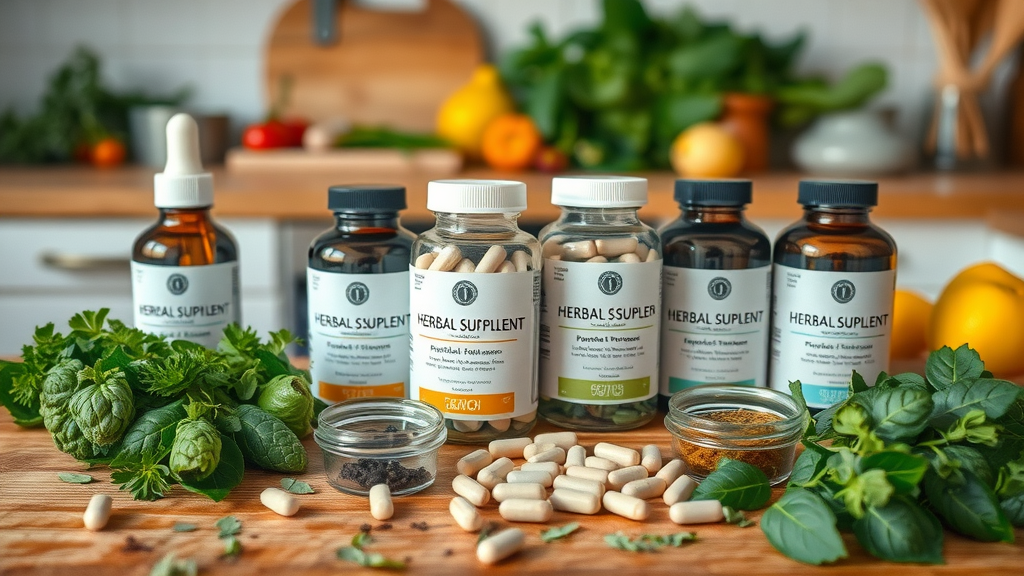
Garlic Extract: Clinical Evidence for Lower Blood Pressure
Magnesium: Support for Healthy Blood Vessel Function
Potassium: Balancing Electrolytes and Lower Blood Pressure
Coenzyme Q10: Antioxidant Benefits for High Blood Pressure
Omega-3 Fatty Acids and Fish Oil: How They Support Blood Pressure
Beetroot Supplements: Nitric Oxide and Your Blood Vessels
Green Tea Extract: Herbal Supplement Backed by Research
Hibiscus Tea: Herbal Supplement for Blood Pressure Health
Melatonin: Surprising Effects on High Blood Pressure
Other Promising Supplements: Hawthorn, Vitamin D, and More
Supplement |
How It Works |
Key Research |
Potential Side Effects |
|---|---|---|---|
Garlic Extract |
Vasodilation, blood vessel relaxation |
2019 meta-analysis (J. Hypertens.) |
Digestive upset, bad breath |
Magnesium |
Electrolyte balance, supports blood pressure |
2021 review (Nutrients) |
Diarrhea at high dosages |
Potassium |
Balances sodium effects in high blood |
2020 study (Lancet) |
Hyperkalemia in kidney disease |
Coenzyme Q10 |
Antioxidant for the blood vessels |
JAMA 2007 trial |
Upset stomach |
Fish Oil (Omega-3 Fatty Acids) |
Supports overall cardiovascular and blood vessel health |
2017 AHA advisory |
Fishy aftertaste |
Beetroot |
Increased nitric oxide for lower blood pressure |
2020 Circulation research |
Red urine/stools |
Green Tea |
Antioxidant, supports blood flow |
2016 Nutrients review |
Caffeine sensitivity |
Hibiscus |
Mild diuretic, vasodilation |
2019 trial (Phytomedicine) |
None reported |
Melatonin |
Nighttime blood pressure regulation |
2017 hypertension study |
Drowsiness |
Hawthorn |
Blood vessel relaxation |
Small RCTs |
Nausea |
Vitamin D |
Supports overall cardiovascular health |
Mixed evidence |
Rare, with very high doses |
How Natural High Blood Pressure Supplements Work to Lower Blood Pressure
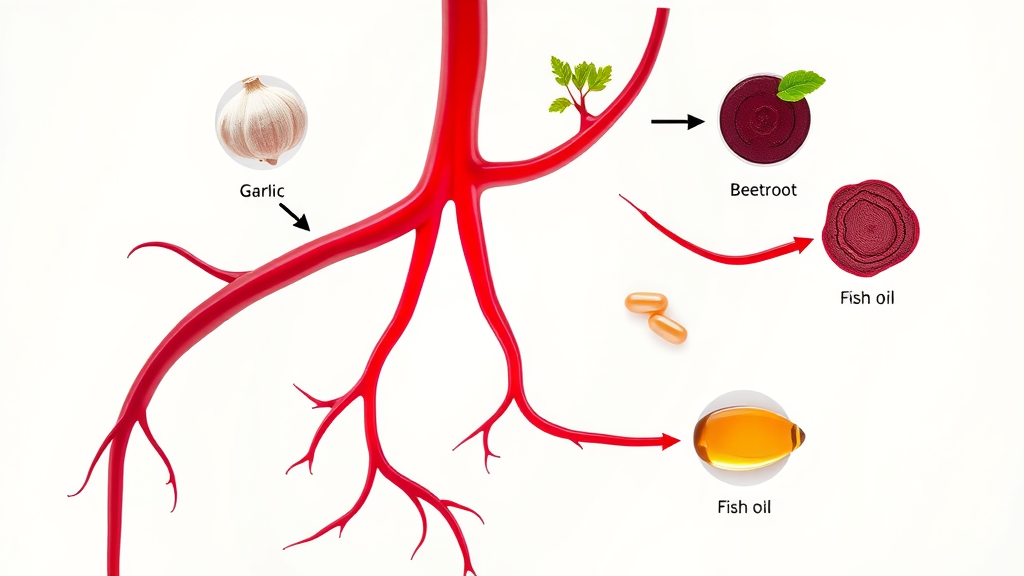
The science behind natural high blood pressure supplements is fascinating: many work through unique mechanisms that target blood vessel relaxation, improved blood flow, and electrolyte balance. For example, garlic extract promotes the production of nitric oxide , which helps to relax and dilate blood vessels, supporting lower blood pressure and healthier circulation. This effect targets both systolic and diastolic blood pressure , shown in numerous clinical studies.
Supplements such as magnesium and potassium contribute by supporting electrolyte balance, thus reducing the impact of sodium (salt), a well-known contributor to high blood pressure. Meanwhile, antioxidants like coenzyme Q10 and fish oil (omega-3 fatty acids) offer protective benefits for the lining of blood vessels, further encouraging stable blood pressure. Some herbal supplements, including green tea and hibiscus, combine natural diuretic properties with vasodilation, further supporting reductions in both systolic and diastolic blood pressure. As a result, many individuals notice measurable improvements in their numbers when combining these supplements with healthy lifestyle changes.
Garlic Extract and Blood Pressure – Evidence and Mechanisms
Garlic extract has long been recognized as a leading option among herbal supplements for lowering blood pressure. Multiple meta-analyses and clinical studies show that daily use of standardized garlic supplements can lead to significant reductions in both systolic blood pressure and diastolic blood pressure . The primary mechanism involves stimulating the production of nitric oxide , resulting in the relaxation and dilation of blood vessels, which directly supports improved blood flow and vascular health.
While raw garlic can be included in the diet, most clinical research focuses on aged garlic extract or standardized capsules for predictable dosing and optimal effect. Patients in studies commonly see a reduction of 5–10 mmHg in their blood pressure readings, especially when used alongside lifestyle changes and a heart-healthy diet. Importantly, garlic extract can occasionally cause digestive upset or interact with certain blood pressure meds, underscoring the need for healthcare provider supervision.
The Role of Magnesium in Lowering High Blood Pressure
Magnesium is a powerhouse mineral crucial for maintaining healthy blood pressure. It helps regulate muscle and nerve function, promotes relaxation of blood vessel walls, and balances the effects of sodium in the body. Consistent clinical data, including a major 2021 review published in Nutrients , highlights that supplementing with magnesium can reduce both systolic and diastolic blood pressure, particularly for those with a documented deficiency or high dietary sodium intake.
Magnesium’s modest lowering effect (typically 2–4 mmHg) is even more pronounced when combined with other lifestyle adjustments, including increased physical activity and reduced processed food consumption. Supplementation is generally considered safe but can cause diarrhea at higher doses or interact with specific medications. Popular dietary supplements formats include magnesium citrate, glycinate, and oxide, while good food sources include leafy greens, nuts, and legumes.
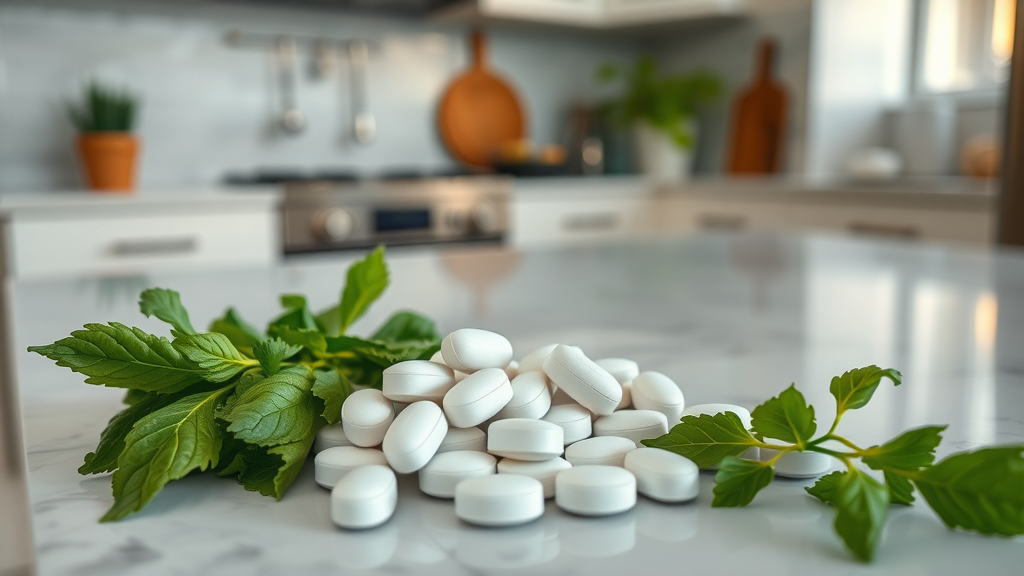
Potassium: Essential for Balanced Blood Pressure
Potassium is key to balancing the body’s sodium levels and plays a vital role in maintaining normalized blood pressure. High potassium intake, particularly from whole foods or supplements, helps reduce blood pressure by promoting sodium excretion and reducing blood vessel tension. A landmark 2020 study in Lancet demonstrated that increasing dietary potassium resulted in noticeable decreases in both systolic and diastolic readings among adults.
Although potassium can be taken as a supplement, most health experts advocate consuming it primarily through foods like bananas, spinach, potatoes, and beans, minimizing the risk of side effects such as hyperkalemia (dangerously high potassium), particularly in those with kidney disease. Always consult a care provider before initiating high-dose potassium supplements, especially if you’re taking a blood pressure med or have other health concerns.
Coenzyme Q10 for Blood Vessel Health in High Blood Pressure
Coenzyme Q10 (CoQ10) is a potent antioxidant produced naturally in the body and is available as a popular dietary supplement. Recent research (including a large JAMA 2007 trial) suggests CoQ10 supports blood vessel flexibility and overall heart health, which directly benefits those seeking to reduce blood pressure. Its influence appears most beneficial in those with elevated oxidative stress or on certain prescription drugs that may deplete CoQ10.
Most studies show modest reductions of 8–10 mmHg in systolic blood pressure and small improvements in diastolic values. CoQ10 is considered safe, with mild stomach upset the most common side effect. Its use is compatible with other supplements such as magnesium and fish oil, but patients should discuss it with a medical provider to check for possible interactions with pressure medication.
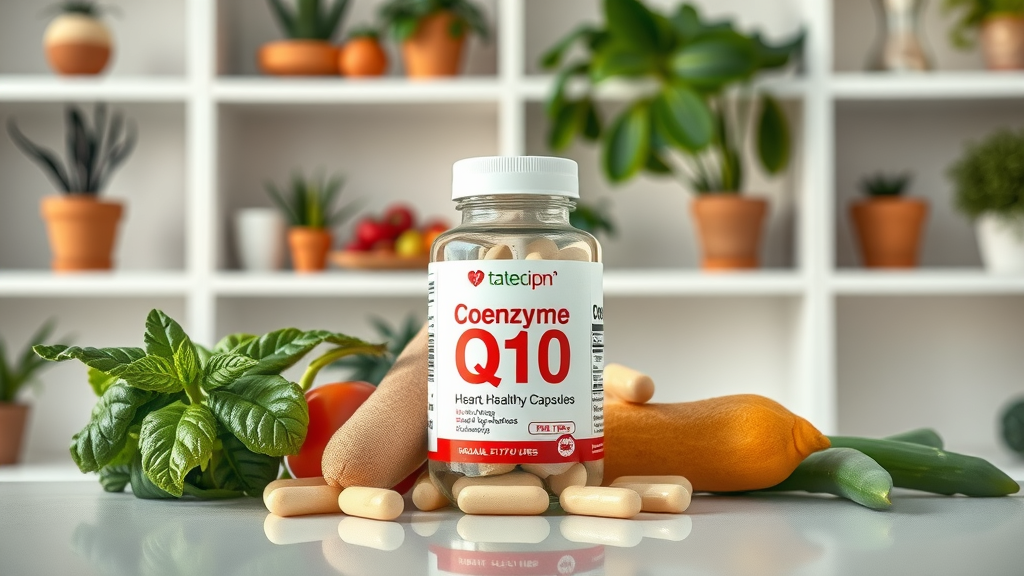
Fish Oil and Omega-3 Fatty Acids: Protecting Blood Vessels and Blood Pressure
Fish oil supplements —rich in omega-3 fatty acids —are well known for their proven impact on blood pressure and arterial function. Studies published by the American Heart Association confirm that regular supplementation (1–4 grams daily of EPA and DHA) leads to modest yet clinically meaningful reductions in high blood pressure , especially among those with elevated baseline readings or additional cardiovascular risk factors.
Omega-3s help reduce inflammation in the blood vessels, improve vascular elasticity, and lower levels of triglycerides, further supporting heart and blood vessel health. Unique side effects include fishy aftertaste and gastrointestinal upset, which can often be minimized by refrigeration or newer, enteric-coated formulations. As with all supplements, combining omega-3s with a clean, heart-healthy diet enhances their results.
How Beetroot and Nitric Oxide Improve Blood Pressure
Beetroot supplements represent a natural, plant-based approach to blood pressure management thanks to their high concentration of dietary nitrates. These compounds are quickly converted in the body to nitric oxide , a signaling molecule that triggers blood vessel relaxation and expansion, facilitating improved blood flow and reduced vascular resistance.
Peer-reviewed research, including 2020 data from Circulation , verifies that regular consumption of beetroot (either as juice or powder) can lower systolic blood pressure by up to 5–7 mmHg. Most users tolerate beetroot well, with red or pink discoloration of urine and stools being the most common (and harmless) side effect. As part of a full cardiovascular support plan, beetroot supplements pair well with other antioxidant-rich foods.
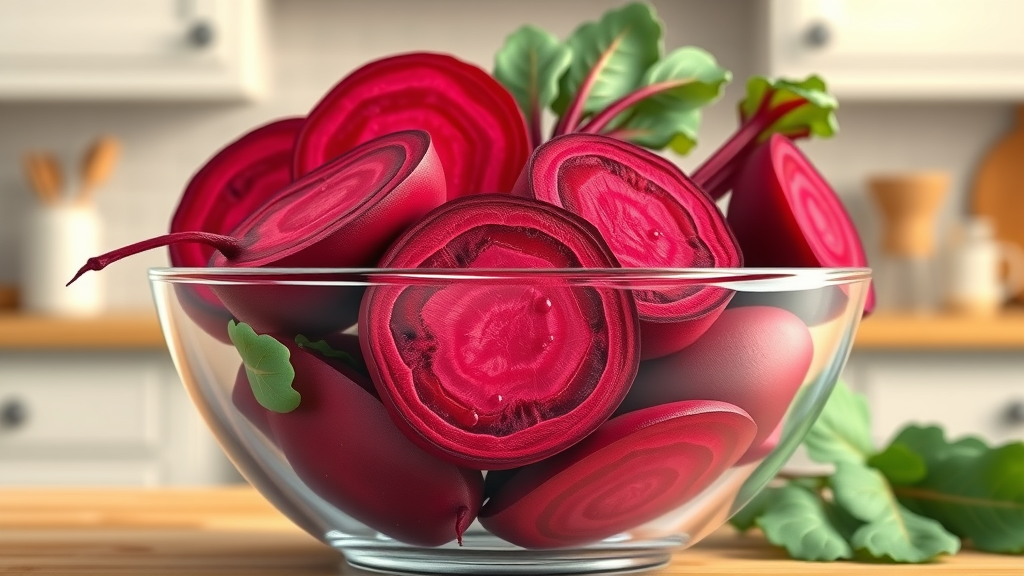
Green Tea and Herbal Supplements – Their Role in Lowering High Blood Pressure
Green tea extract along with other herbal supplements, offer blood pressure support through antioxidant action and gentle diuresis. Green tea polyphenols, especially epigallocatechin gallate (EGCG), have been linked to beneficial reductions in both systolic and diastolic blood pressure, supporting studies published in Nutrients . Regular intake, whether as a beverage or concentrated supplement, also supports vascular health and may help with cholesterol control.
Beyond green tea, herbs like hawthorn, hibiscus, and olive leaf have a long history of use for cardiovascular well-being. While effects are typically mild for most, combining herbal supplements with prescription medications or other blood pressure med should be done under healthcare supervision. Side effects are rare but may include dizziness or mild GI upset for those sensitive to caffeine or before combining green tea with other stimulants.
Hibiscus: Clinical Evidence for Blood Pressure Benefits
Hibiscus tea is an ancient herbal remedy supported by modern research: a 2019 clinical trial in Phytomedicine demonstrated that daily hibiscus tea consumption could lower systolic blood pressure by 7 mmHg or more. Its mechanism centers on gentle diuretic activity, enhancement of blood vessel flexibility, and mild antioxidant benefit.
Users appreciate its tangy, refreshing flavor, which makes it a pleasant alternative to plain water. Unlike other herbal supplements, hibiscus has virtually no reported side effects and is generally considered safe for most adults. Its effectiveness may be maximized by combining with other natural high blood pressure supplements and lifestyle modification strategies for a holistic blood pressure lowering effect.
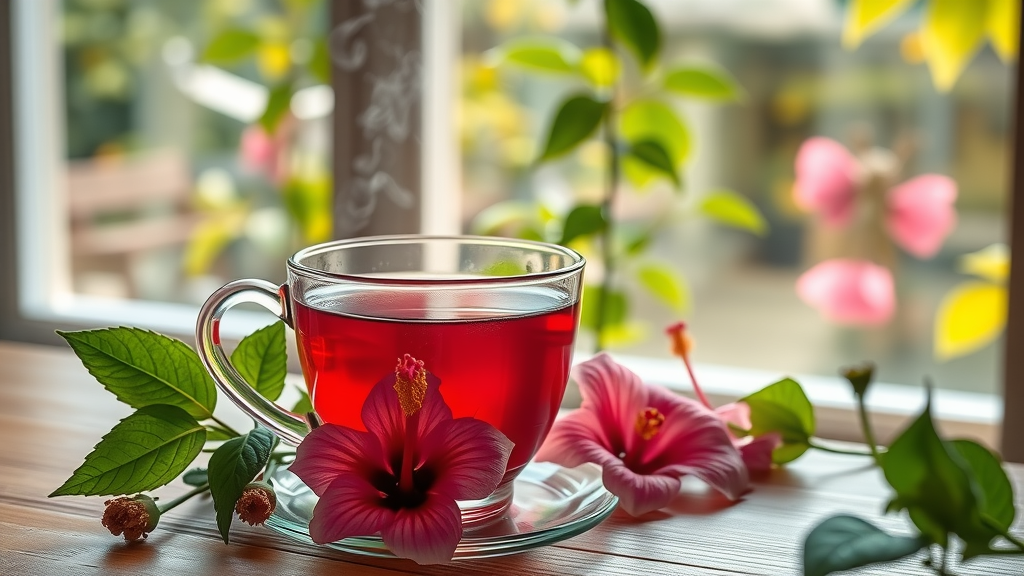
Less Common Natural Supplements for High Blood Pressure: A Look at Hawthorn, Vitamin D, Melatonin
There are additional promising but less commonly used natural high blood pressure supplements such as hawthorn, vitamin D, and melatonin . Hawthorn has been the subject of several small randomized clinical trials, suggesting mild reductions in blood pressure through its blood vessel relaxing properties. It may complement other interventions but does occasionally cause nausea.
Vitamin D is critical for overall cardiovascular health, with observational research indicating that deficiency may contribute to more severe blood pressure elevation. Meanwhile, melatonin —better known as a sleep aid—has shown an unexpected ability to modestly reduce nighttime blood pressure, making it of particular interest for those with nocturnal hypertension.
These options are best considered when traditional and first-line natural supplements have been optimized. Speak with a care provider about how these may fit into your personal regimen, especially if you’re on pressure meds or have additional health conditions.
Comparing Natural High Blood Pressure Supplements to Prescription Blood Pressure Medications
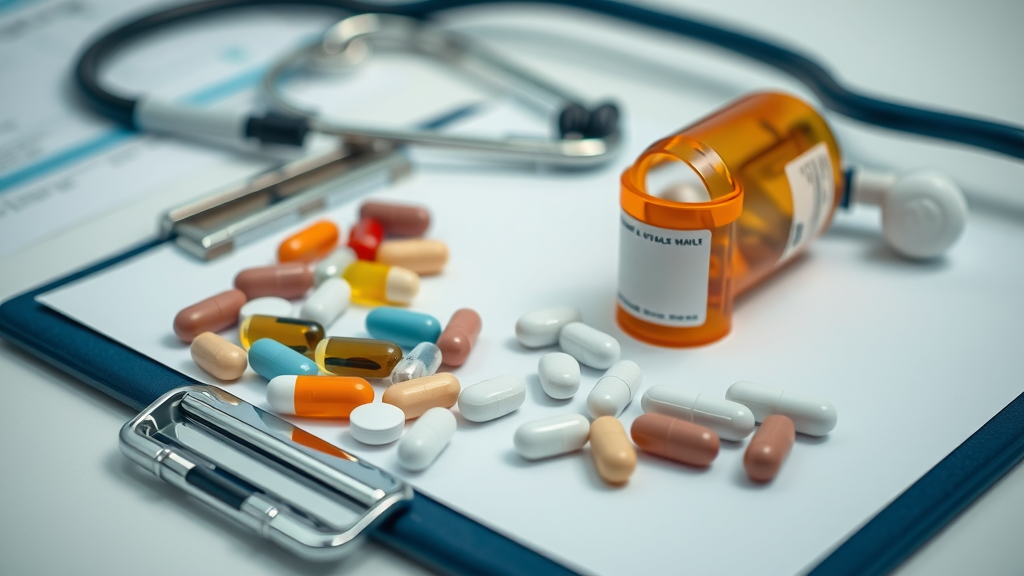
"Natural supplements can’t always replace pressure medications, but for many, they offer meaningful support alongside traditional therapy." – Leading Cardiologist Interview
Efficacy of Natural High Blood Pressure Supplements Versus Blood Pressure Medication
While many natural high blood pressure supplements have solid scientific backing, prescription blood pressure medication remains more consistently potent and predictable for severe or resistant hypertension. Medications are regulated, undergo rigorous testing for efficacy, and are closely monitored. However, supplements like garlic extract, magnesium, and fish oil can result in reductions of up to 10 mmHg for many users—especially those with mildly elevated numbers or in early stages of high blood pressure.
The combined approach is increasingly common. Using dietary supplements as part of a wider lifestyle modification plan (including improved diet and activity levels) can mean improved outcomes, fewer side effects, and—in some instances—lower required doses of prescription drugs. Always work with your care provider to track your progress.
When to Consider Both Herbal Supplements and Prescription Medication
It’s most appropriate to integrate natural high blood pressure supplements when you have mild hypertension, are interested in reducing your medication burden, or when aiming to support vascular and overall heart health. People already stabilized on blood pressure med may benefit from supplementing if additional reductions in numbers are desired, or to offset the side effects of traditional drugs (such as using CoQ10 with statins).
Never discontinue prescription medications without professional guidance, as abrupt withdrawal can increase risk of heart disease, stroke, or other complications. Approach new supplements gradually, monitoring for physiological changes and working with a professional who understands both traditional and integrative medicine.
Safety Considerations: Blood Pressure Med vs. Natural Supplements
Safety is paramount. While most natural supplements are considered safe for the majority of users, there are risks: potential for side effects , interactions with blood pressure medication, and even unpredictability in over-the-counter supplement quality. The Food and Drug Administration (FDA) does not regulate dietary supplements as strictly as prescription medications, leaving potential for variability in potency and purity.
Always purchase from reputable brands, check labels carefully, and keep an ongoing log of side effects or new symptoms. Seniors or those on multiple meds (especially blood pressure med or heart disease medication) must consult their care provider before self-experimentation.
Potential Side Effects and Interactions of Natural High Blood Pressure Supplements
What to Watch for: Common Side Effects among Herbal Supplements
While natural high blood pressure supplements tend to be well-tolerated, they can still result in side effects . Garlic extract may lead to digestive issues or unpleasant breath, magnesium may cause diarrhea at elevated doses, and fish oil sometimes produces a fishy aftertaste or mild stomach upset. Beetroot can turn urine or stools red, which is harmless but alarming if unexpected.
Green tea and herbal supplements may cause caffeine-related symptoms in sensitive individuals (such as insomnia or jitteriness). Most side effects are dose-dependent and diminish over time, but if you experience persistent issues, reduce your dose or try an alternative reputable brand and notify your care provider.
Key Blood Pressure and Pressure Medications Interactions
Supplement–drug interactions are especially relevant for those taking blood pressure med. Potassium supplements in particular can dangerously increase blood potassium levels when combined with medications such as ACE inhibitors or potassium-sparing diuretics. Garlic, hawthorn, and even CoQ10 can theoretically potentiate the blood-pressure-lowering effects of medication, sometimes resulting in dizziness or even fainting.
For those with heart disease or on complex medication regimens, working closely with your care team prevents unwanted effects and ensures effective, safe therapy.
Who Should Avoid Certain Natural High Blood Pressure Supplements
Not every supplement is right for every person. Individuals with kidney disease should be cautious with potassium and magnesium, while those on anticoagulant therapy should approach garlic, fish oil, and green tea with care due to increased risk of bleeding. Pregnant or breastfeeding women should avoid lesser-studied supplements except under direct supervision.
Ultimately, the best approach is a personalized plan crafted with your specific health circumstances and goals in mind.
Lifestyle Changes to Enhance Results from Natural High Blood Pressure Supplements
Diet, Exercise, and Stress: Sustainable Blood Pressure Support
Natural supplements work best when paired with proven lifestyle changes. Prioritize a diet high in fresh vegetables, fruits, lean protein, and healthy fats—akin to the Mediterranean or DASH diet. Reduce processed salt, cut out trans fats, and incorporate regular physical activity (such as brisk walking, cycling, or swimming), which improves blood flow and vascular flexibility.
Chronic stress elevates high blood pressure by perpetually activating the body’s sympathetic (“fight or flight”) nervous system. Techniques like mindfulness, meditation, or gentle yoga can moderate stress responses and enhance supplement efficacy.
Reducing High Blood Pressure Risk through Lifestyle Change
Beyond direct blood pressure lowering, healthy lifestyle habits decrease the risk of other cardiovascular issues like heart disease and stroke. Smoking cessation, moderation of alcohol, and weight loss are powerful interventions. Studies show that even a modest 5–10% reduction in body weight can improve both systolic and diastolic blood pressure numbers in at-risk groups.
The most successful long-term strategies combine high-impact dietary changes, consistent exercise, and supplement use, setting the foundation for lasting blood pressure control without frequent reliance on prescription medication.
People Also Ask: Answers About Natural High Blood Pressure Supplements
What is the best natural high blood pressure supplement?
Garlic extract, magnesium, potassium, and fish oil rank among the most effective natural high blood pressure supplements, according to recent clinical studies.
What is the best natural remedy for high blood pressure?
Besides supplements, the best natural remedies include a Mediterranean diet, weight loss, regular exercise, and stress management, all shown to lower blood pressure.
Is there a natural supplement I can take for high blood pressure?
There are several, including magnesium, omega-3 fatty acids from fish oil, green tea extract, and beetroot supplements—each supported by scientific evidence.
What do the Chinese take for high blood pressure?
In traditional Chinese medicine, herbal supplements such as hawthorn berry, chrysanthemum, and motherwort are commonly used for managing high blood pressure, typically combined with lifestyle change and diet.
[Embeds a reputable, up-to-date expert video summary of the top 5 natural high blood pressure supplements, featuring clinical evidence and practical recommendations.]
[Embeds an educational video with step-by-step instructions, featuring a doctor or clinical nutritionist, explaining safe supplement integration with lifestyle practices and medication regimens.]
Expert Tips: Maximizing the Benefits of Natural High Blood Pressure Supplements
Consult with a healthcare provider before starting any new supplement, especially if on blood pressure med
Start with a low dose and monitor for side effects
Combine supplements with healthy lifestyle changes for best results
Frequently Asked Questions on Natural High Blood Pressure Supplements
Can supplements replace prescription blood pressure medications?
Are these natural supplements safe for seniors?
How long does it take to see blood pressure improvements?
Do I need to cycle or pause herbal supplements?
What should I avoid mixing with these high blood pressure remedies?
Summary: Are Natural High Blood Pressure Supplements Right for You?
Natural high blood pressure supplements offer measurable support for many people, especially when integrated with lifestyle change
They are rarely a complete substitute for prescription blood pressure medication, but often enhance results
Consultation with a health professional is essential prior to beginning any supplement for high blood pressure
Where to Learn More About Senior Health & Natural High Blood Pressure Supplements
"For more great articles on Senior Health & Wellness, visit https://ElderEarth.us"
 Add Element
Add Element  Add Row
Add Row 




Write A Comment